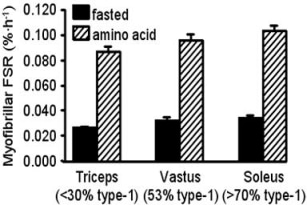In animals the rate of muscle protein synthesis (MPS) is higher in red, oxidative muscles than white, glycolytic muscles. It is commonly assumed that the same is true in human beings. There are no data, however, from studies in human beings to support this assumption; in fact, there are indications to the opposite. First, the population variance of the rate of MPS in human vastus is small (~13%) although the fibre-type composition of the vastus ranges from ~30 – 70% type-1 in the general population. Secondly, the reported basal rates of MPS are similar among different muscles (e.g., rectus abdominus, vastus, deltoid, tibialis, multifidus) that are known to vary markedly in fibre-type composition. To investigate whether or not fibre-type composition affects human MPS we measured the rate of incorporation of [1,2-13C]leucine into vastus, triceps, and soleus after an overnight fast and subsequently during infusion of a mixed amino acid solution (75 mg⋅kg-1⋅h-1) in six young, healthy men (27±1y; 76±4 kg; all data are means±SEM); fibre-type composition was determined in aliquots of the biopsies. Vastus was 55±4% type-1 fibres, triceps 65%. The basal myofibrillar fractional synthetic rates (FSR, %⋅h-1) were 0.031±0.002 (vastus), 0.027±0.001 (triceps) and 0.035±0.002 (soleus); amino acids increased myofibrillar FSR ~2-fold above basal to 0.93±0.004 (vastus), 0.086±0.005 (triceps) and 0.097±0.005 (soleus). There was a significant main effect (twoway repeated measures ANOVA) for amino acid infusion (P<0.001) and the muscle studied (triceps FSR being ~15% smaller than those of soleus and vastus; P<0.05). These data suggest that in human, unlike animal muscle, fibre-type composition is not a very important determinant of the rate of muscle protein synthesis. This study was approved by the Copenhagen and Fredriksberg communities ethics committee, Denmark and was supported by grants from the Danish Medical Research Council, the US National Institutes of Health, The Wellcome Trust and UK Medical Research Council.
University of Glasgow (2004) J Physiol 557P, C70
Communications: Is the rate of human muscle protein synthesis fibre-type specific?
B. Mittendorfer (a),J.L. Andersen(b), P.Plomgaard (b), B.Saltin (b), J.A. Babraj(c),K.Smith(c) and M.J. Rennie(d)
(a) Geriatrics & Nutritional Sciences, Washington University School of Medicine, St Louis, MO, USA, (b) Copenhagen Muscle Research Center, Copenhagen, Denmark, (c) School of Life Sciences, University of Dundee, Dundee, Scotland, UK and (d)Graduate Entry Medical School, University of Nottingham, Derby, England, UK
View other abstracts by:
Where applicable, experiments conform with Society ethical requirements.

